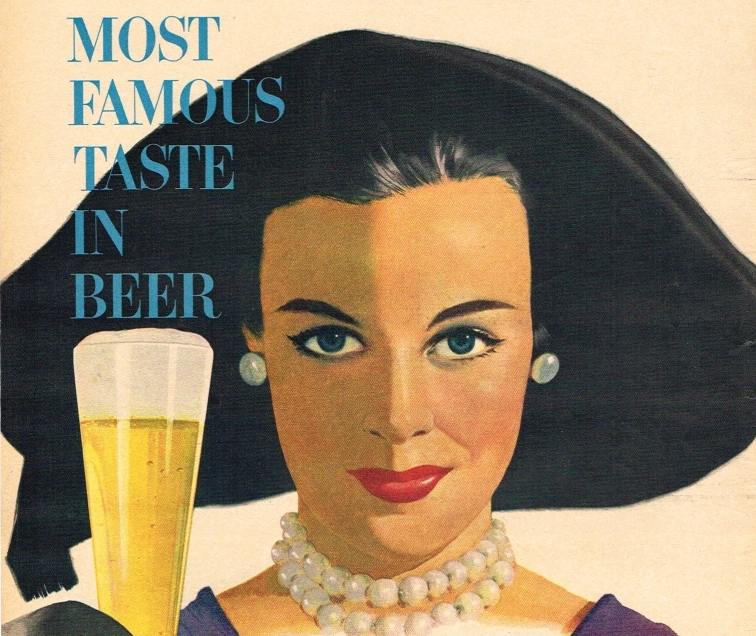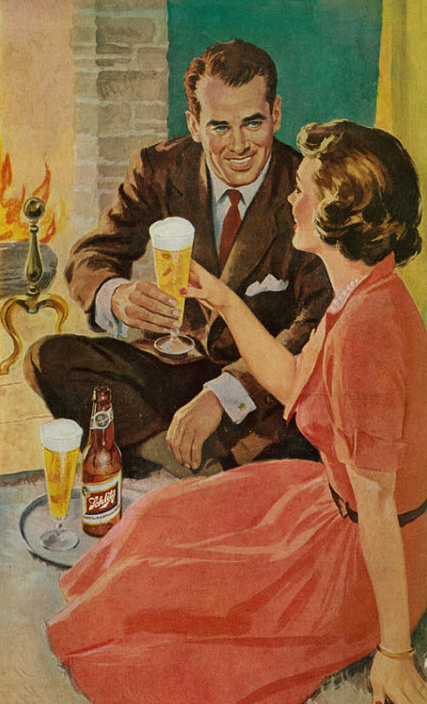The following is from a “soapbox” talk at the Student Association’s “Prof n’ Stein,” a regular convivial gathering of students and professors for the sake of enjoyment, laughter, and theological levity. Corresponding to the Theological Symposium, Prof. Erik Herrmann was asked to give the soapbox on Martin Luther’s Heidelberg Disputation. September 18, 2018.
Good beer is likely a mortal sin.

To understand this assertion rightly, I need you to understand that the emphasis is on the words “good” and “likely.” It is good beer, that is, in contrast to bad beer that is likely to be a mortal sin. Someone asked me in class when they heard the title of my soapbox, if bad beer would then be a venial sin, to which my reply is “yes, much more likely than if it were good.” Secondly, the word “likely” or “probably” is important because good beer is not by necessity a mortal sin,—it is not intrinsically evil—but only contingently so. That is to say, more often than not, in the most common conditions, good beer is a mortal sin.
So hopefully this has cleared up any misconceptions about what I mean.
Still, for the few of you that may have no idea what I’m talking about, let me explain further. “Good beer is likely a mortal sin” is a riff off of Luther’s Heidelberg Disputation, especially the first several theses:
1. The law of God, the most salutary doctrine of life, cannot advance man on his way to righteousness, but rather hinders him.
3. Although the works of man always seem attractive and good, they are nevertheless likely to be mortal sins.
5. The works of men (i.e. “good” works [“bad” works are not in the running]) are thus not mortal sins, as though they were crimes.
7. The works of the righteous would be mortal sins if they would not be feared as mortal sins by the righteous themselves out of pious fear of God.
8. Thus are the works of man mortal sins when they are done without fear and in unadulterated, evil self-security.
And then jumping to the end:
24. Without the theology of the cross man misuses the best in the worst manner.
Charles Taylor, in his massive book, The Secular Age sets forth his central question at the very beginning of the book: “Why was it virtually impossible not to believe in God in, say, 1500 in our Western society, while in 2000 [or 2018!] many of us find this not only easy, but even inescapable?”
There are many answers to this question that he explores, but one worth pondering is the following. Taylor writes: “religion simply becomes unnecessary when technology gets to a certain level: we don’t need God any more, because we know how to get it [anything that we need] ourselves.”

So what does all of this have to do with good beer, good works, the good law and mortal sins? It’s simply this: the higher the thing, the greater its fall.
St. Paul tells this story in Romans 1 and Luther follows it closely. God’s invisible qualities, his goodness, divine and eternal power were clearly perceived in creation. But human beings, instead of honoring God and giving thanks for the goodness of the creation, worshiped the creature! And not the low base creatures—no idol worship around the slug, the cockroach, or weasel—but the eagle, the lightning, the sun! Likewise, Adam and Eve did not desire low or evil things. They wanted to “be like God” (and isn’t this the highest goal of piety?—isn’t that the goal of the Christian life?). “The tree was good for food, it was a delight to the eyes, it was to be desired to make one wise.” It’s not the bad beer, the thin, runny beer, but the good beer, the thick, chewy, hoppy stuff — that’s the stuff that’s worth a religion or two.
And while Luther is emphasizing how sin perverts the very best things—the good law of God and the good works of man—by worshiping them, I think we have it even harder. We are better off than we’ve ever been. Our knowledge of the world, our ability to bring convenience to our lives and extend human flourishing through science and medicine and technology is vast, a good gift from our creator. But it is harder than ever to need a creator when we can seemingly create our own utopias.
C.S. Lewis has been channeling Luther’s theology for me for some time now. Why this is so will have to wait for another soapbox lecture. But Lewis illustrates this basic theological principle in numerous places throughout his writings, and perhaps most vividly in the Great Divorce. If you are not familiar with the book, Lewis tells of a bus trip of various souls to the vestibule of heaven in order to reflect on sin and salvation. Near the end of the book a woman who has lost her son has allowed her love for her child to highjack the possibility to love God. Finally she yells out:
“…Give me my boy. Do you hear? I don’t care about all your rules and regulations. I don’t believe in a God who keeps mother and son apart. I believe in a God of Love. No one has a right to come between me and my son. Not even God. Tell Him that to His face. I want my boy, and I mean to have him. He is mine, do you understand? Mine, mine, mine, for ever and ever. … Mother-love— It is the highest and holiest feeling in human nature.”
Then the interlocutors turn away and discuss how it is possible that something so high and holy like a mother’s love for her child could really be a hindrance to heavem.
GM: “There’s something in natural affection which will lead it on to eternal love more easily than natural appetite could be led on. But there’s also something in it which makes it easier to stop at the natural level and mistake it for the heavenly. Brass is mistaken for gold more easily than clay is. And if it finally refuses conversion its corruption will be worse than the corruption of what ye call the lower passions. It is a stronger angel, and therefore, when it falls, a fiercer devil.”
CL: ”I don’t know that I dare repeat this on Earth, Sir,” said I. “They’d say I was inhuman: they’d say I believed in total depravity: they’d say I was attacking the best and the holiest things.” …
GM: “There is but one good; that is God. Everything else is good when it looks to Him and bad when it turns from Him. And the higher and mightier it is in the natural order, the more demoniac it will be if it rebels. It’s not out of bad mice or bad fleas you make demons, but out of bad archangels. The false religion of lust is baser than the false religion of mother-love or patriotism or art: but lust is less likely to be made into a religion.”
So where does that leave us? What are we supposed to do with this ostensibly good beer? Are we only to drink swill so that we hope for heaven?!
Again, C.S. Lewis gives us some insight into our problem. Our problem is not that we enjoy things too much, but that we are too easily satisified with created things. Lewis from The Weight of Glory:
“Our Lord finds our desires, not too strong, but too weak. We are half-hearted creatures, fooling about with drink and sex and ambition when infinite joy is offered us, like an ignorant child who wants to go on making mud pies in a slum because he cannot imagine what is meant by the offer of a holiday at the sea. We are far too easily pleased.”
And so, in the face of this foolishness of our wisdom, our wise God has played the fool. God has now revealed himself, hidden beneath suffering, weakness, and death — the exact opposite of all the glitter that the good creation has to offer, the last place where people expected to find God. And by doing this, the cross has shocked us into putting things in their proper place, to hold on to the gifts of creation loosely and tentatively, so that, following Christ into the far side of death, we can find the glory of a new creation. As Lewis said, “A cleft has opened in the pitiless walls of the world, and we are invited to follow our great Captain inside. The following Him is, of course, the essential point.”
There is indeed a glory here that points to the glory to come. The cross does not supply a new ethic or aesthetic that now calls for a celebration of the base, the broken, or the wicked (this seems to be the problem with the interpretation of the cross in Nadia Bolz-Weber and others). The faith that the cross evokes in us does not force us to reject everything in this present life as having no value in its relation to the life to come. But this glory is likely not found in good beer or any other good thing except … my neighbor. This is the only theology of glory that a Christian may embrace: if I begin by desiring the glory of my neighbor, perhaps the other glorious things of creation can give us the proper glimpses of things to come. Lewis again to the end:
“The load, or weight, or burden of my neighbour’s glory should be laid daily on my back, a load so heavy that only humility can carry it, and the backs of the proud will be broken. It is a serious thing to live in a society of possible gods and goddesses, to remember that the dullest and most uninteresting person you talk to may one day be a creature which, if you saw it now, you would be strongly tempted to worship … it is with the awe and the circumspection proper to them, that we should conduct all our dealings with one another, all friendships, all loves, all play, all politics. There are no ordinary people. You have never talked to a mere mortal. Nations, cultures, arts, civilization—these are mortal, and their life is to ours as the life of a gnat. But it is immortals whom we joke with, work with, marry, snub, and exploit—immortal horrors or everlasting splendours. This does not mean that we are to be perpetually solemn. We must play. But our merriment must be of that kind (and it is, in fact, the merriest kind) which exists between people who have, from the outset, taken each other seriously—no flippancy, no superiority, no presumption. And our charity must be a real and costly love, with deep feeling for the sins in spite of which we love the sinner—no mere tolerance or indulgence which parodies love as flippancy parodies merriment. Next to the Blessed Sacrament itself, your neighbour is the holiest object presented to your senses. If he is your Christian neighbour he is holy in almost the same way, for in him also Christ vere latitat—the glorifier and the glorified, Glory Himself, is truly hidden.”
So in that spirit, I conclude this Prof-n-Stein™ soapbox by announcing that on September 28—here at Concordia Seminary, for the celebration OctoberFest—my glorious brothers and sisters in Christ—I will serve you… beer.


Leave a Reply
You must be logged in to post a comment.